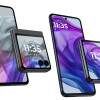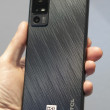AT&T and Cricket Take Phone Traffickers to Court
Article
Comments 3
Aug 31, 2018, 4:02 AM by Eric M. Zeman
AT&T and its prepaid business Cricket Wireless are targeting cell phone traffickers with legal action. The company has filed lawsuits against several businesses and individuals suspected of trafficking new prepaid cellphones. Trafficked phones are typically purchased in bulk from AT&T or Cricket Wireless at a discount and then unlocked without permission by AT&T/Cricket. The buyers often discard the original packaging and sell the phones at higher prices to make a profit. AT&T says this practice "negates the subsidy that AT&T Prepaid and Cricket intended to benefit the consumer." The lawsuits, filed with the U.S. district court in New Jersey, target US Mobile Pros LLC and Maz Wireless, LLC.
Related
 Motorola Brings More Affordable 5G Phones to its 2024 Lineup
Motorola Brings More Affordable 5G Phones to its 2024 Lineup
Mar 12, 2024
Motorola has announced the 2024 editions of the moto g 5G and moto g power 5G, priced at $200 and $300, respectively (MSRP, unlocked). Both phones offer 5G, a vegan leather finish on the back, 120 Hz display refresh, 50 megapixel main camera, 5,000 mAh battery, 128 GB storage (expandable), NFC, fingerprint reader (on the side), and a headset jack.
What Case?
What case do they really have here? SIM Unlocking is already been deemed LEGAL in the USA, whether the company selling the device gives permission or not. If you're buying the phone, it is yours to do what you wish. The company sells devices at a lower price (still more than they purchase them from the OEM), in exchange locking the SIM to only use one provider, in hopes that you will spend more with that company who then will recoup the full retail value (an artificially inflated price) of the device over a period of time. But you're not obligated to do that. You can top up and pay into the prepaid plan and ask for an unlock code if you chose, or you can take that device and use other methods to unlock it.
If AT&T doesn't want these devi...
(continues)
That is an inaccurate statement
"The company sells devices at a lower price (still more than they purchase them from the OEM"
They sell the devices for a subsidized price that is LOWER than the OEM price to the carrier.


 Motorola Upgrades its razr Foldables Across the Board
Motorola Upgrades its razr Foldables Across the Board
 Motorola Gives its Stylus Phone a Spec Bump
Motorola Gives its Stylus Phone a Spec Bump
 Motorola Brings More Affordable 5G Phones to its 2024 Lineup
Motorola Brings More Affordable 5G Phones to its 2024 Lineup
 Moto Gives its Affordable g play More Value
Moto Gives its Affordable g play More Value
 Cricket Launches Phone with 6,000 mAh Battery
Cricket Launches Phone with 6,000 mAh Battery



